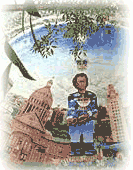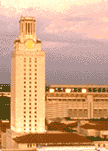 |
 |
 |
 |
 |
 |
 |
| Privacy Policy |
| Disclaimer |
| Terms & Conditions |
|
Study in USA: Austin
And, if your image of Texas is limited to rodeos and dusty old-movie Westerns, you're in for an awakening. There are hills to the west, prairie to the east and the Colorado River flowing right through an oasis of a college town. Schools
Campus and Student Life: UT Austin is home to students from all over Texas, all 50 states and about 120 foreign countries. Being the largest single-campus institution in the nation, it certainly has the capacity. Founded on 40 acres near the state capitol, the University's reach now extends well beyond a 357-acre main campus. UT Austin offers its students a range of social, recreational, academic, leadership and athletic opportunities through more than 800 student organizations. If you're looking for a private education within the city, there's St. Edward's University. It offers 3,400 students a liberal arts education characterized by small classes. Behavioral and social sciences, business, education, humanities and natural sciences are among the fields included in 33 majors for undergrads and two master's degrees for graduate students. St. Edward's also offers a nontraditional degree for adults through its New College, which provides 42 areas of concentration. Campus and Student Life: St. Edward's 180-acre campus is nestled south of downtown Austin. From the Running Club to the International Club, St. Edward's offers students a variety of campus activities. Students may hone their leadership, academic, social and recreational skills through more than 65 student clubs and organizations. If you don't mind living outside the city, there's Southwestern University. It offers 1,300 undergrads a liberal arts education in an environment known for small classes and a scenic campus. Natural sciences, accounting, fine arts, humanities, communications and women's studies are among SU's more than 30 majors. SU also offers pre-professional programs in engineering, business, education, theology, law and medicine. In addition, the university's endowment is one of the largest per-student endowments in the country. SU has even been listed among U.S. News & World Report's "America's Best Colleges" and "Best College Values." No graduate programs are offered. Campus and Student Life: Located 28 miles north of Austin, in Georgetown, Southwestern is set on a 500-acre campus topped with limestone buildings designed in a Richardsonian Romanesque architectural style. It is a residential campus, with about 83% of its students living in campus residence halls and apartments. Students have access to 81 campus organizations and to Austin. Employment Opportunities When you enroll, you'll need extra cash for whatever comes up. No sweat. Austin is the silicon valley of the south. A dotcom related job is one option. And, Austin is home to Dell. If that doesn't work out, there's always extra-acting work in one of the many movies filmed in Austin. You can also try an on campus job. The Universities are some of Austin's largest employers. Setting Up House Your best bet is getting set up by the ever-accommodating campuses. As far as the off campus living situation stands, the Austin apartment market is downright spandex tight. Austin Apartment Report shows that current occupancy tops 98 percent in the Intown area. Most other parts of the city record occupancy in the 96 to 97 percent range. Monthly rents are above $800, and the city is experiencing rent growth at or above the level as the San Francisco Bay/Silicon Valley region, Boston, Washington, DC and parts of Southern California. Links to visit for more info can be found at Rentals and Apartment Living. You can also check out the private dorm situation through the Austin Private Dormitory Association. Around Austin Once you settle in, try to have fun once in a while. There's plenty to enjoy on campus: concerts, comedians, films, lectures, etc.,. But you can also drive out. Yes, you'll definitely need a car in the lone-star state. Sites: The brave will want to visit the largest urban bat colony in North America. As perhaps the most impressive scene to behold, bats emerge from crevices in the Congress Bridge at mid-evening every day. Thousands of them fill the night air on their noctural search for food. For less intimidating attractions, tour the Texas State Capitol, peruse the Benson Latin American History Collection, walk through the L.B.J. Library, or explore the Inner Space Caverns. Outdoor Recreation: A great place, where you'll find it all is Town Lake Hike-and-Bike Trail. It curves around the Colorado River-otherwise known as Town Lake. If you follow the trail you'll quickly see why Austin has been lauded a "runner's paradise" by Runner World magazine. The path crosses through the largest park in the city and wanders near Barton Springs--a quintessential Austin hangout in the summer. If you don�t care for jogging, rent a canoe or paddleboat for $10 an hour at a nearby kiosk. You can also opt to explore Zilker Park Botanical Gardens, camp in the Hill Country, boat on the San Gabriel River, or fish at Lake Georgetown, Lake Travis, or any of the five other lakes.
Eating: For good food, there are plenty of
restaurants.
If you want to try something unique to the area, nothing beats Tex-Mex. It's a cuisine that has
gained cross-country popularity with such chains as Chevy's and Chili's. But there is nothing better t
han authentic cooking. The most infamous is Nightlife: Downtown Austin has a thriving nightlife on West 4th and 6th Streets. Fourth draws a professional crowd to some of the city's nicest bars and restaurants. Austin doesn't suffer the sometimes-sickening image self-consciousness of places like L.A., (come'on, people still wear big hair) so expect food to be very involved. Consider the Fado Irish Pub for a pint of Guinness and some cottage pie. Miguel's La Bodega is popular for Mexican food, margaritas, and salsa dancing. After dinner, sip a martini and listen to jazz at Speakeasy, or explore some of the city's favorite clubs. Sixth hosts thousands for music and dancing. Try the Jazz. A few blocks down, Stubb's offers Texas barbecue, cold beer and live music. Find cheap drinks and karaoke at Bob Popular or Paradox. Lastly, the Austin experience isn't complete without seeking out at least a night of Country Western or Tejano dance. Music and Film: As you've probably already gathered from the summary of nightlife, the local live music scene is accorded much respect. Same goes for the growing movie industry-feature and indie alike. For a sampling of what Austin has to offer in these categories, take in one of the annual South by Southwest festivals. Finally, remember that not all stereotypes of places hold true. Some may try to tell you that Texas is backward-thinking. But think about this: It's a huge place. There are some bad places, some good, and lots of space for error. Austin is definitely good. It is a city known for its arts and culture scene, its liberal outlook, and its appeal to the thinkers. Fortune wouldn't have named it one country's top five "intellectual capitals" if it were otherwise. For more info on Texas universities, visit: http://www.governor.state.tx.us/Texas/universities/
|
 |
| ||||||||||||||||||||||||||||||
|
| ||||||||||||||||||||||||||||||
Home | About iStudentCity | Job Opportunities | Contact iStudentCity Hall
Copyright©2000-2009, iStudentCity.com. All Rights Reserved.
 There's an old cliche about the size of things in Texas. Well, if you decide to study in Austin,
you'll discover that from the largest bat colony to the largest campus in the U.S. it holds true.
Whether your choice is university or college, public or private, large or small, Texas has it all.
Of course, there's enough room for it!
There's an old cliche about the size of things in Texas. Well, if you decide to study in Austin,
you'll discover that from the largest bat colony to the largest campus in the U.S. it holds true.
Whether your choice is university or college, public or private, large or small, Texas has it all.
Of course, there's enough room for it!
 The most obvious academic choice is the
The most obvious academic choice is the  Shopping: An afternoon walk down South Congress Street will take you past
Shopping: An afternoon walk down South Congress Street will take you past

